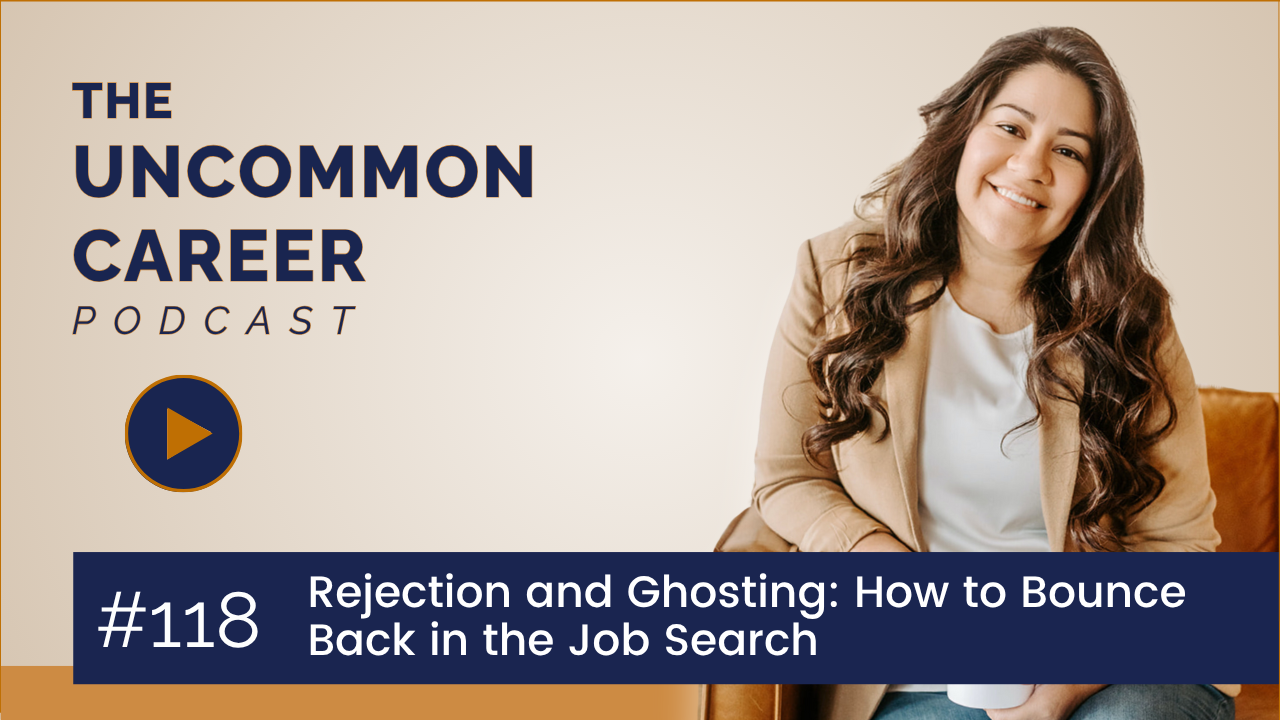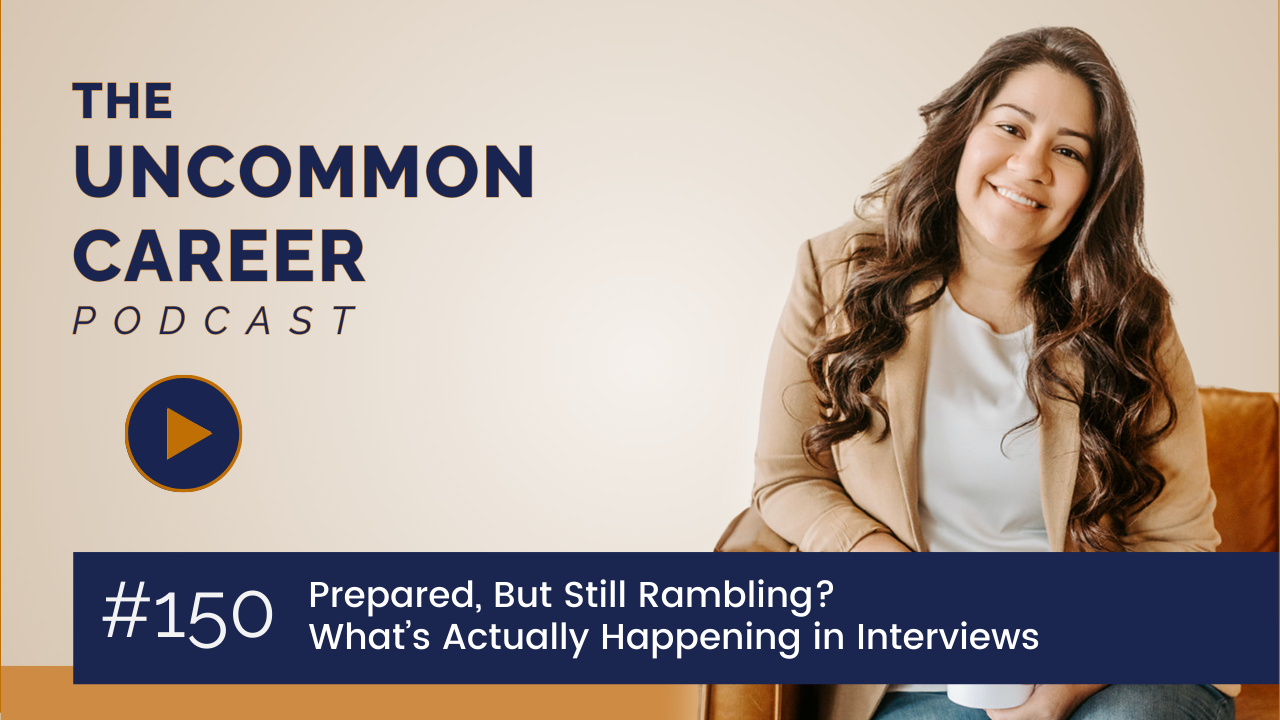118. Rejection and Ghosting: How to Bounce Back in the Job Search
Jul 01, 2025
Got Rejected? Here's How to Bounce Back
Rejection. Ghosting. Those dreaded words in the job search that can take the wind out of even the most motivated candidate’s sails. After all the energy invested—customizing resumes, prepping for interviews, showing up fully—it can feel like hitting a brick wall when the answer is “no” or, worse, silence.
But rejection and ghosting don’t have to be the end of the story. In fact, they’re critical parts of the process that, when understood and reframed, can actually become your competitive advantage. This guide unpacks how to use these tough moments as data, opportunities, and fuel to refine your strategy and mindset so you keep moving forward.
|
Listen on your favorite podcast app: |
| |
See Rejection as Data—Not a Verdict
First and foremost, rejection is a data point.
It’s not a judgment on worth, talent, or long-term potential.
It’s simply feedback from one step in one process with one company at one point in time.
Think of it like this:
-
Applied to 20 roles? Landed three final interviews? That ratio gives actionable insight.
-
Consistently dropped at screening? Time to rework resume and online presence.
-
Progresses well to final rounds but loses out at offer stage? Interview strategy likely needs refinement.
By treating each “no” as a point in a larger dataset, patterns emerge that can inform what to keep doing, what to improve, and what to drop altogether.
This shift in perspective transforms rejection from something personal and painful into practical, useful information.
It’s the foundation for a more strategic, sustainable job search.
Ghosting and Rejection as the Start of a Relationship
Most job seekers see rejection or ghosting as the final, closed door in the hiring process.
But these moments are actually the beginning of a potential future opportunity.
If a company invested time in reviewing a resume or conducting multiple interviews, they were already sold on most of the qualifications.
Even if someone else edged out the offer, being in the final pool is no small thing.
That’s the moment to:
-
Reach back out graciously. Thank them for the process.
-
Reaffirm interest. Share why the company still aligns with personal goals.
-
Open the door. Express interest in future roles or projects.
Instead of leaving a rejection as the last word, transform it into the start of a professional connection.
Hiring needs shift constantly, and the candidate who stayed visible, respectful, and interested often gets the first call next time.
Depersonalize the Experience to Regain Perspective
When the “no” hits the inbox, it feels personal.
It feels like a value judgment. But the reality is often far more neutral:
-
Another candidate may have had niche experience.
-
Internal changes or budget constraints may have altered the role.
-
The team might have realized a need for a different focus mid-process.
Depersonalizing doesn’t mean dismissing disappointment—it means separating personal worth from situational outcomes.
Try reframing:
-
Instead of “I’m not good enough,” think “This company prioritized a different skillset.”
-
Instead of “They didn’t want me,” think “They needed something else at this time.”
This subtle shift creates space to analyze without shame—and strategize next steps without defeat.
Tools for Emotional Recovery and Resilience
A strong job search strategy isn’t just tactical—it’s emotional.
The ability to recover from rejection quickly, regain motivation, and keep going is essential.
Here are tools to build that resilience:
1. Intentional Reflection or Prayer
For those of faith, prayer can offer grounding, perspective, and peace. But any form of intentional reflection—journaling, meditation, quiet thought—creates space to process the experience.
This time isn’t about ignoring emotions but acknowledging them fully.
Frustration, disappointment, even anger are normal.
Giving them room to exist is how they lose power.
2. Understand the Emotional Cycle
Rejection can trigger a sequence that mirrors grief or change management models:
-
Denial: “This can’t be happening.”
-
Anger: “Why them? Why not me?”
-
Bargaining: “What if I’d said this? Done that?”
-
Hopelessness: “What’s the point in trying?”
-
Acceptance: “Okay. Let’s regroup and keep going.”
Recognizing this cycle normalizes the feelings.
It doesn’t shortcut them, but it helps prevent getting stuck in the downward spiral of negativity.
3. Practice Micro Wins
Even in rejection, there are wins to find.
Maybe the interview was a chance to test a new story.
Maybe the feedback hinted at a resume tweak.
Identifying even one micro win shifts the internal narrative:
-
“That interview helped clarify the role I actually want.”
-
“I practiced communicating a tough career pivot.”
-
“I made a new connection in the industry.”
These small reframes help transition from a negative cycle of frustration to a positive cycle of momentum.
Recognizing and Redirecting the Spiral
Think of the feedback loop in four stages:
-
Experience: The rejection or ghosting
-
Thoughts and Emotions: Frustration, fear, doubt
-
Motivation: Often drops, causing withdrawal
-
Behavior: Less outreach, fewer applications, half-hearted prep
This cycle can easily become self-fulfilling, where lowered effort leads to more rejection.
Breaking it means interrupting the loop between stages 1 and 2:
-
Reframe thoughts immediately after the experience.
-
Focus on learning, not loss.
-
Shift emotional energy toward preparation, not rumination.
This is where micro wins become essential.
Every small positive thought can restart the spiral in the other direction, increasing motivation and improving action.
Turning Data into Strategy
Rejection or ghosting isn’t a signal to give up—it’s an invitation to refine the process.
Ask:
-
“What did this interview teach about the industry or role?”
-
“What feedback can be implied even if none was given?”
-
“What gaps can be closed for next time?”
-
“How can my story or branding be clearer, sharper, more aligned?”
Use rejection as a training ground.
Every process that improves after a rejection increases the chance of a successful next round.
Shifting from Isolation to Support
One of the biggest challenges in dealing with rejection is doing it alone.
When the whole process happens in isolation, the mental spiral becomes harder to catch.
Working with others—whether through coaching, peer accountability, or trusted colleagues—offers perspective.
An external voice can challenge unhelpful assumptions, highlight blind spots, and reinforce strengths that might feel invisible in the moment.
Beyond the "No": Building the Long Game
The hiring cycle isn’t just a series of applications—
It’s an ongoing opportunity to build reputation and relationships.
Rejection today doesn’t preclude a yes tomorrow if the relationship is maintained with:
-
Gratitude and grace in follow-ups
-
Continued visibility in industry conversations
-
A willingness to stay connected without immediate expectation
Professional networks remember respectful candidates who handle “no” well.
Sometimes, the candidate who maintained connection is first in line when new roles open.
Keep Moving Forward
Job searches can be discouraging. They’re filled with uncertainty, delay, and rejection. But they’re also filled with opportunity, learning, and transformation.
Rejection and ghosting aren’t the end—they’re pivots. Data points. Invitations to improve, connect, and clarify.
By treating each setback as a source of information and opportunity, the search transforms from a gauntlet of judgment to a strategy of growth.
So take the time to process. Use the tools. Refine the approach.
And keep moving—because every “no” is one step closer to the right “yes.”













